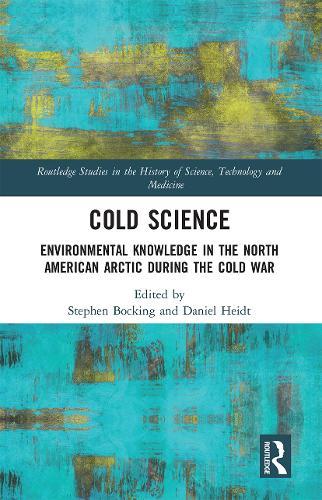Overview
Science during the Cold War has become a matter of lively interest within the historical research community, attracting the attention of scholars concerned with the history of science, the Cold War, and environmental history. The Arctic—recognized as a frontier of confrontation between the superpowers, and consequently central to the Cold War—has also attracted much attention. This edited collection speaks to this dual interest by providing innovative and authoritative analyses of the history of Arctic science during the Cold War.
Full Product Details
Author: Stephen Bocking , Daniel Heidt
Publisher: Taylor & Francis Ltd
Imprint: Routledge
Weight: 0.453kg
ISBN: 9780367660383
ISBN 10: 0367660385
Pages: 308
Publication Date: 30 September 2020
Audience:
College/higher education
,
Tertiary & Higher Education
Format: Paperback
Publisher's Status: Active
Availability: In Print 
This item will be ordered in for you from one of our suppliers. Upon receipt, we will promptly dispatch it out to you. For in store availability, please contact us.
Table of Contents
List of Contributors Part 1. Introductory perspectives 1. Introduction: Cold War science in the North American Arctic Stephen Bocking and Daniel Heidt Part 2. Strategic science 2. Ice and the depths of the ocean: probing Greenland's Melville Bay during the Cold War Mark Nuttall 3. Leadership, cultures, the Cold War and the establishment of Arctic scientific stations: situating the Joint Arctic Weather Stations (JAWS) P. Whitney Lackenbauer and Daniel Heidt 4. Frontier footage: science and colonial attitudes on film in Northern Canada, 1948–1954 Matthew S. Wiseman 5. Portraying America's last frontier: Alaska in the media during the Second World War and the Cold War Victoria Herrmann 6. Making 'Man in the Arctic': academic and military entanglements, 1944–49 Matthew Farish Part 3. Cold War economies 7. Arctic pipelines and permafrost science: North American rivalries in the shadow of the Cold War, 1968–1982 Robert Page 8. Cold oil: linking strategic and resource science in the Canadian Arctic Stephen Bocking 9. Icebergs in Iowa: Saudi dreams, Antarctic hydrologics and the production of Cold War environmental knowledge Rafico Ruiz 10. Science and Indigenous knowledge in land claims settlements: negotiating the Inuvialuit Final Agreement, 1977–1978 Andrew Stuhl Part 4. Science crossing borders 11. Knowledge base: polar explorers and the integration of science, security, and US foreign policy in Greenland, from the Great War to the Cold War Dawn Alexandrea Berry 12. Institutions and the changing nature of Arctic research during the early Cold War Lize-Marié van der Watt, Peder Roberts, and Julia Lajus 13. Rockets over Thule? American hegemony, ionosphere research and the politics of rockets in the wake of the 1968 Thule B-52 accident Henrik Knudsen 14. Applied science and practical cooperation: Operation Morning Light and the recovery of Cosmos 954 in the Northwest Territories, 1978 P. Whitney Lackenbauer and Ryan Dean 15. Melting the ice curtain: indigeneity and the Alaska Siberia Medical Research Program, 1982–1988 Tess Lanzarotta Part 5. Epilogue: global Cold War—the Antarctic and the Arctic 16. Antarctic science and the Cold War Adrian Howkins Index
Reviews
Author Information
Stephen Bocking is a Professor with the Trent School of the Environment at Trent University, Canada. Daniel Heidt is the Research and Administration Manager at the Centre on Foreign Policy and Federalism, St. Jerome's University, Canada.
Tab Content 6
Author Website:
Customer Reviews
Recent Reviews
No review item found!
Add your own review!
Countries Available
All regions
|




